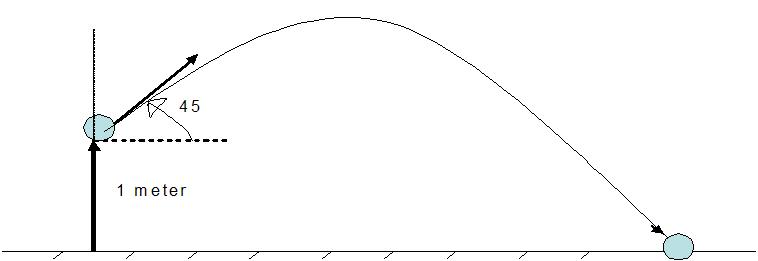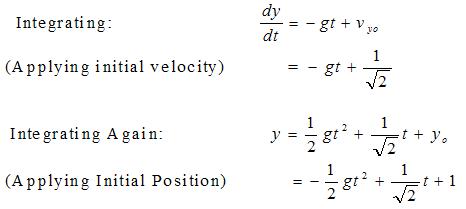Example of Engineering Problem Solving Strategy
Problem Statement:
A ball is through into the air with a velocity of 1.0 m/sec. at a 45 ° angle. Calculate the time it takes before it hits the ground. Assume that the ball is initially 1m above the ground.
(This is actually a problem from Physics, but quite similar to engineering problems)
Step1. Problem Abstraction
First draw a figure depicting the scenario outlined in the problem.

.Needed: time to hit the ground
Given: Initial velocity and direction and initial location.
Abstraction: Ball goes up and is pulled down by gravity and follows a “parabolic” path ( from empirical observation of thrown objects). Vertical velocity will decrease, become zero and then become negative. Motion in vertical and horizontal directions can be decoupled.
Step 2. List of Variables
We will need vertical and horizontal velocities, v x and v y
Initial Velocities are known:
v xo = (1m/sec) cos 45 °= 0.707 m/s
v yo = (1m/sec) sin 45° = 0.707 m/s
d y = vertical distance traveled by the ball, m
t = time, sec
Step 3. Basis for Calculation
None required for this problem
Step 4. Assumptions
- Ground is flat
- Air resistance can be neglected
- Acceleration due to gravity is 9.8 m/sec 2
Step 5. List References
Physics Text, p.135
Step 6. Develop model Equations
The vertical motion is governed by the equation (from the definition of acceleration). We define a new variable, y (meters) to indicate the vertical distance from the ground. The variable g is used to indicate the acceleration due to gravity (assumed constant, another assumption).

Initial position (t=0) y = 1.0 m; Initial vertical velocity = 0.707 m/s
Step 7. Solve

We want to know when the ball hits the ground (y = 0).
![]()
Substituting for
![]()
we obtain: t = 0.529 sec or t = -0.385 sec
Negative answer is not acceptable. Hence time to hit the ground = + 0.529 sec.
Step 8. Interpret Solution
The answer seems reasonable from an intuitive point of view. The ball does not travel far before it hits the ground. You can get a physical feel for the answer by throwing the ball yourself and seeing how long it takes to hit the ground.